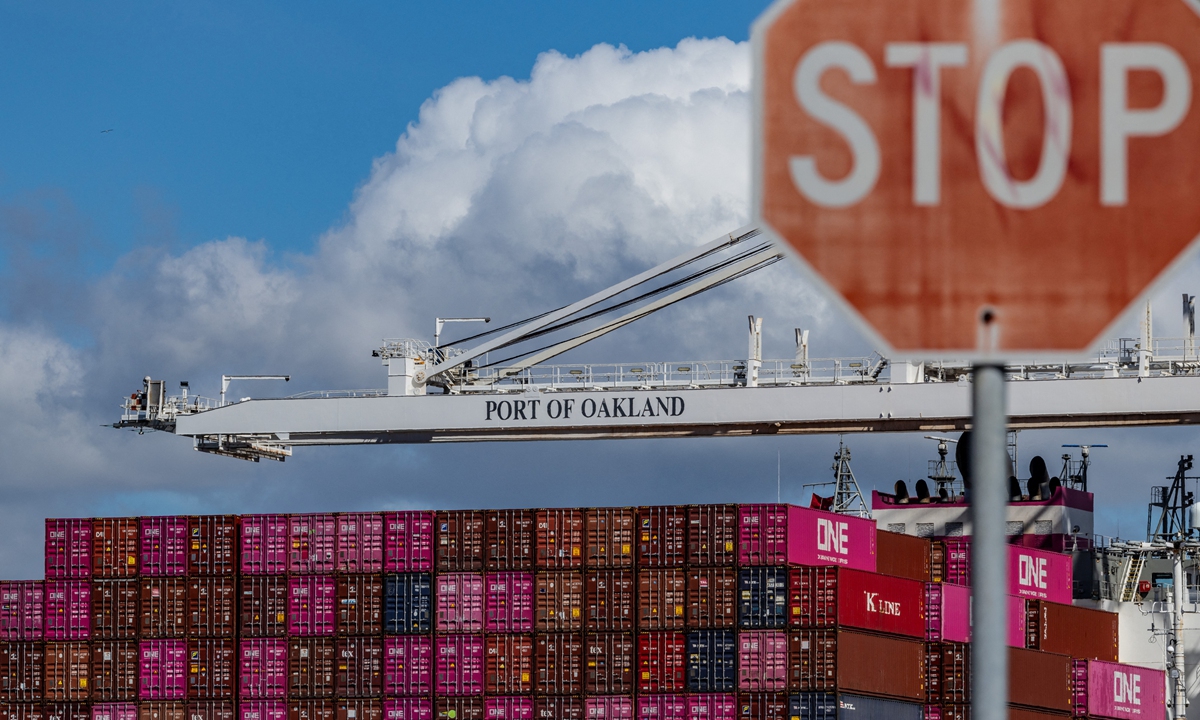
A cargo ship full of shipping containers is seen at the port of Oakland as trade tensions escalate over US tariffs, in Oakland, California, US, on March 6, 2025. Photo: IC
The world's manufacturing purchasing managers' index (PMI) showed a notable decline in business activity last month, with a significant drag from the Americas, according to the China Federation of Logistics and Purchasing (CFLP) on Sunday.
The index tracking the global manufacturing PMI stood at 49.6 in March, down 0.4 points from the previous month and slipping into contraction territory, China Media Group reported, citing data from the federation. A reading above 50 suggests expansion while a reading below 50 indicates contraction.
Regionally, the Americas' manufacturing PMI fell to 48.9 in March, a sharp 1.3-point drop from February, which was the primary factor behind the global index's decline, the CFLP said.
Sun Chuanwang, a professor at Xiamen University in Fujian Province, told the Global Times on Sunday that the drop in the manufacturing PMI reflected global concerns over US economic policies and weakened confidence of US consumers as the US government rolled out successive trade protectionist measures.
In March, the US government created confusion and disruptions in global industrial and supply chains, with its announcement of imposing steep tariffs on steel and aluminum, on goods from China, and on vehicles, market watchers said.
The US manufacturing sector slid back into contraction on both the supply and demand sides after a brief, two-month stay in expansion territory, the CFLP report said.
While the effects on boosting reshoring will need future examination, the tariffs seem more likely to cause a rise in domestic production costs in the US, according to the report.
US trade policies and tariffs are already fueling a decline in American consumer confidence. The Conference Board reported recently that its consumer confidence index fell 7.2 points in March to 92.9, the fourth straight monthly decline and its lowest reading since January 2021, Reuters reported.
As the US' so-called reciprocal tariffs trigger global responses, JP Morgan has revised up its prospect of a risk of a global recession this year to 60 percent from 40 percent earlier, according to Reuters.
Over the weekend, protests were reported in multiple US cities, as the US announcement of steep tariffs on most countries around the world triggered a sell-off on Wall Street and sparked fears of a global trade war and recession.
No country can achieve so-called self-sufficiency by way of imposing tariffs, and eventually, countries will need to return to the path of cooperation and win-win under the multilateral trade framework, researchers from the CFLP wrote.
Hu Qimu, deputy secretary-general of the digital-real economies integration Forum 50, told the Global Times on Sunday that as a key economic indicator, the month-on-month decline in America's manufacturing PMI is a reflection that companies there are forecasting a rise in costs by a level that consumers will be finding it difficult to accept following the tariffs.
"As a result, businesses may have tamed their activity," Hu said, noting that the US government's economic policies have posed a great challenge to the existing international division of labor, causing great disruptions.
However, the CFLP report pointed out some silver linings in the global manufacturing landscape. Outside the Americas, Europe posted a reading of below 50 but with a minor improvement over a month earlier.
Africa's manufacturing PMI entered expansion territory with a reading of 50.8 in March. Asia's PMI reading was 51.3, the second consecutive month in which the reading firmed above 51. The growth in Asia received significant support from an improved reading in China, the federation said.
In the first quarter of 2025, the global manufacturing PMI averaged 49.9, up from 49.2 in the fourth quarter of 2024. The data suggested a slight recovering momentum compared with 2024, though the index remained at a relatively low level, the CFLP said.
"As the US economy casts a negative impact on global economic growth, Asia led by China will continue to be the main engine driving global economic recovery and growth," Sun said.
The Asian economy is projected to grow by 4.5 percent in 2025, with its share rising to 48.6 percent of global economic output measured by purchasing power parity, according to a report released by the recently concluded Boao Forum for Asia.
"Even as the unwarranted and unreasonable US tariffs continue to disrupt global industrial and supply chains, the major trend of global trade and economic cooperation won't be altered, with China playing an increasingly vital role in safeguarding global trade stability and supporting the global economic recovery," said Sun.
Separately, the CFLP on Thursday posted a reading for the Chinese logistics sector, coming in at 51.5 and returning to expansion territory, a notable improvement in business activity.




